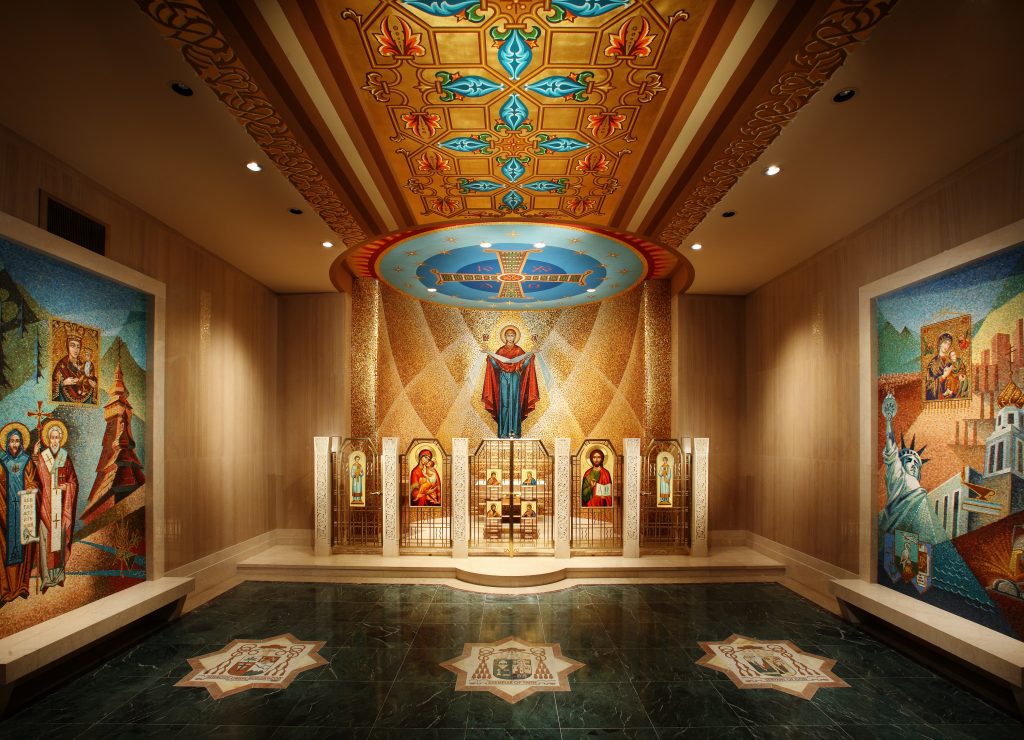
As another school year begins, we are highlighting the story of Dave Zahren, one of the many dedicated teachers involved with the National Shrine. Not only is he a docent at the Basilica, but he has taught students all around the world – in America, Kenya, and even on live television!
This year, Dave celebrates his 46th year as a television instructional specialist with the Prince George’s County Public Schools’ Department of Television Resources and Web Service. Today, he shares about his rich experiences in the classroom, on TV, and as a docent and lector at the Basilica.
You spent some time in Kenya with the Peace Corps. Can you tell us a little about that experience?

My Peace Corps service in Kenya was not only a highlight of my life – it was also largely responsible for my choice of teaching as a career. It was certainly a leap of faith for the Corps to assign me to a Kenyan school to teach high school biology when I’d never taught anything before! I went directly from graduating from the University of Pittsburgh, where I’d been a biology major, to Peace Corps training in Nairobi. There, I became a student teacher at a local school, learned enough Kiswahili to be conversant, and then made my way alone to countryside schools on buses traveling bumpy roads. I experienced the various cultural shocks of being in a foreign land – like having teatime twice a day! I quickly discovered that the formal education we Americans take for granted is a privilege in much of Kenya, where school fees are challenging for many families and a poor score on countrywide exams can close off all further opportunity. My students, who were housed on campus, often begged for extra classes in the evenings and on weekends. They were all eager to learn and hoped to be admitted to university – and many of them were and went on to successful careers. But in the end, I feel that I gained far more than I was able to give; the respect and kindness of the students and their families have stayed with me to this day.
Much of your experience is centered around space education. Can you tell us what first inspired your interest in space?
Growing up at the dawn of the space age, I’d always dreamed of what it would be like to travel to a different world. I was caught up in the heroics of Alan Shepard, John Glenn, and the Apollo mission astronauts, and inspired by the irrepressible aspiration of President Kennedy. Not only did he fulfill his 1961 promise to put a man on the moon “before the decade was out,” but he also created the Peace Corps, providing teaching opportunities for generations of Americans.
His exhortation to young Americans – “Ask not what your country can do for you – ask what you can do for your country,” – spurred many young idealists like me to rise to the challenge.
So years later, when I learned about the NASA Teacher in Space program started by President Reagan, I felt it was tailor-made for me and my fellow teachers, all starry-eyed about space and eager for the chance to elevate the teaching profession.
Can you tell us a little about your background as a teacher? What was it like going from teaching in the classroom to being a teacher with a TV program?
 When I returned from my two-year stint as a teacher in Kenya, I enrolled at Penn State to earn my official Pennsylvania teaching credentials. After taking all the requisite courses, including student teaching for a semester in a Pittsburgh suburb, I got a teaching job in Prince George’s County, MD. And while that job had challenges far different from those in Kenya, I persevered and saw progress every day. After my first five years – which I viewed as an apprenticeship – I finally thought of myself as the kind of empathetic and competent teacher I’d always wanted to be.
When I returned from my two-year stint as a teacher in Kenya, I enrolled at Penn State to earn my official Pennsylvania teaching credentials. After taking all the requisite courses, including student teaching for a semester in a Pittsburgh suburb, I got a teaching job in Prince George’s County, MD. And while that job had challenges far different from those in Kenya, I persevered and saw progress every day. After my first five years – which I viewed as an apprenticeship – I finally thought of myself as the kind of empathetic and competent teacher I’d always wanted to be.
11 years after I began teaching In Maryland, I left the classroom to participate in NASA’s Teacher in Space program as one of the two teachers selected from Maryland. After the horrific Space Shuttle Challenger accident, NASA deputized us teachers as Space Ambassadors to go out as speakers to rekindle faith in the space program. Having had so many media opportunities that year, when I returned to the school system and was given the opportunity to create television shows for our cable station, I was ready. Televised teaching was difficult at first. I missed the direct feedback from students. But I had learned that classroom audiences were much like those at home watching TV: they both respond to enthusiasm and to “performers” talking directly to them and understanding who they are.
Can you tell us about the different programs for teachers and students you’ve been a part of? Why are you passionate about education?
I spent one year of my time in Prince George’s County as an IST, an Instructional Support Teacher. In that position, I visited classrooms throughout schools to offer suggestions and co-teach with both new and seasoned teachers looking for new ideas. One of my great joys is serving as the emcee for all the new teachers arriving in Prince George’s County Public Schools each August as the school year is about to begin. At PEIP (Professional Educators Induction Program), I help an extremely talented group of staff development specialists explain the school system’s rules and regulations to the 750-1100+ new teachers. And most importantly, I also tell them about the responsibilities and great satisfaction their jobs are about to bring.
You’ve worn many hats – from teacher, to weatherman, to TV host – what unique insights and experiences have you gained from each role, and which has been your favorite?

It’s almost impossible to choose a favorite among the jobs I have had! But TV Host is my first choice among equals. With nervous youngsters sitting on a TV set before an audience of parents, relatives, friends, and classmates – all the important people in their lives – it’s my job to relieve their anxiety as best I can and let them know that they’ve won just by being there as school representatives. Sometimes, they are so nervous they forget their names! Of course, they all want to win and acquit themselves well before their fans. But I try to make it fun, dignify any errors, and make a point of complimenting and encouraging them throughout the games – all to make their TV appearance a memorable experience.
How can Catholic teachers leave a lasting impact on their students?
Teaching is very much about role modeling, and I can’t think of a better example of a well-lived life than a teacher who follows the commandments. Along with guiding students through various academic subjects, perhaps a teacher’s most profound influence comes through their empathy and acts of kindness.
How did you first get involved with the Basilica?
While attending Mass at the Basilica in early 2016, I heard an announcement that potential volunteers should report to the sanctuary after Mass. Since I had just recently retired from my weekend weather forecasting job at Channel 7, I had the time to volunteer. But for what, I had no idea! The young man who greeted me in the sanctuary asked if I wanted an application for tour guides or for lectors, and I said, “Just give me both.” Over the next months, through fits and starts, and many days walking the Shrine alone to familiarize myself with the tour script, my confidence grew. I knew I could do the job – I just needed to do my homework! I was commissioned as a docent in December 2016 and started as a lector in August 2020. What a privilege it’s been to share the story of Mary’s House and – thanks to Dee Steel’s insistence – to also serve as a lector. I often think about how well teaching and television work have prepared me for these roles.
What’s your favorite thing about being a docent at the Basilica?
There is no better feeling than hearing the “wows” when visitors walk into the Upper Church for the first time. The size and majesty of the building never fail to overwhelm, and nearly every visitor expresses appreciation for the experience at the end of the tour. Like with the audiences I’ve encountered in classrooms, auditoriums, and on TV, I try to read the tour group, finding out who they are and where they’re from, and then tell the Shrine’s story highlighting specific details that would be of unique interest to them. My hope is for all visitors to have an emotional reaction and leave thinking that our missionary-like zeal is every bit as important as our marble and mosaics. I can honestly say that I’ve enjoyed each and every tour I’ve given
What role has the Basilica played in your life, and how has it impacted your faith?

I often told people when I first started at the Basilica that my weekend volunteering was a way for this former altar boy to atone for missing so many Sunday Masses over a 25-year period when he was weather forecasting on Sunday mornings! So, my docent work has really been a voyage of rediscovering a faith that had in many ways been put on hold. The chance to serve Our Lady as a tour guide and to read God’s words as a lector has reawakened my fervor. Memories of those long-ago altar boy days come flooding back each and every time I serve.
Are there any places in the Basilica that have special meaning to you? Are there any saints in particular whose stories inspire you?
As for favorite devotional sites at the Shrine, there are two: the Byzantine Ruthenian Chapel, because my mother grew up in an Eastern Rite church in Pittsburgh; and the Our Lady of Africa Chapel, a poignant reminder of my Peace Corps days in Kenya. As for saints, since St. Anthony was my grandmother’s favorite, it is he to whom I often turn. I’m told I was to be called “Anthony,” but somehow “David ” elbowed him aside!
What words of encouragement do you have for students starting the new school year?
With the pandemic still raging, the new school year that many of us had hoped would be “normal” is destined to test our patience once again. With masks again obscuring much of our humanity – our revealing facial expressions – the connection between teachers and students will be sorely tested yet again. Confusion over vaccine status will only add to what will be high levels of suspicion and anxiety. So, what are students to do? I say try to ignore the inconveniences, and just celebrate being back with your friends! After a year of social isolation, enjoy seeing and talking to your teachers in person. And say a prayer that we’ll finally beat back the virus. Know too that you’ve learned and continue to learn a tough lesson: that we should appreciate and never take for granted all our blessings and the loved ones around us. And don’t forget to have as much fun as you can and make up for all the laughs you’ve missed!
Mr. David Zahren is currently a television instructional specialist with the Prince George’s County Public Schools’ Department of Television Resources and Web Services. This is his 46th year with PGCPS. Over the past 30+ years, Mr. Zahren has written, produced, and hosted four award-winning science programs that have aired on cable television: “Give Science A Hand,” a hands-on approach to science aimed at elementary school students; “Science Bowl,” an interscholastic science game show; “Under the Microscope,” a series of staff development programs for elementary teachers that also airs nationwide on PBS stations, and a new series, “Anatomy of a Lesson.”
Mr. Zahren is a cum laude graduate with a Bachelor of Science degree from the University of Pittsburgh and has a master’s degree in school administration and human relations from George Washington University. In 1985, after a teaching career that had spanned fourteen years, including three years as a Peace Corps volunteer in Nairobi, Kenya, Mr. Zahren was selected as Maryland’s Teacher in Space candidate. He was one of 100 teachers chosen from the 40,000 applicants nationwide to vie for a flight aboard the space shuttle Challenger.
Mr. Zahren has received a number of awards, including the CINE Golden Eagle, for his work as a science teacher, a television host and producer, and a space educator. He continues to produce and host public television programs with the Department of Television Resources and Web Services in Prince George’s County and is in his 17th year as host for “It’s Academic,” a high school quiz program that airs on WJZ-TV, the CBS affiliate in Baltimore. He retired in 2015 from Washington’s WJLA-ABC 7/News Channel 8 after working 25 years as a part-time weather forecaster.

